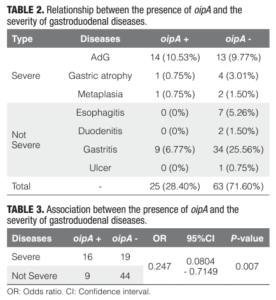HIGHLIGHTS
- Evidence points to an association between the H. pylori oipA gene and gastropathies.
- There is a high prevalence of H. pylori infection with a relevant percentage of oipA+ strains.
- More severe gastropathies were observed in those infected with H. pylori oipA+ strains.
ABSTRACT – Background –
Helicobacter pylori is an etiologic agent of gastroduodenal diseases. The microorganism, considered a type I carcinogen, affects about 50% of the global population. H. pylori virulence factors are determinant for the clinical outcome of the infection. The outer inflammatory protein A (oipA) gene encodes an outer membrane adhesin and is related to severe gastropathies, such as gastric cancer. Objective – The aim of this study was to evaluate the association of the oipA gene with the severity of gastroduodenal diseases in dyspeptic patients in region Central Brazil. Methods – The polymerase chain reaction (PCR) was used to determine the presence of H. pylori. Samples positives were used for molecular screening of the oipA gene. Gastropathies were categorized as non-severe and severe diseases. Results – Approximately 68% of patients had H. pylori and 36% were infected with H. pylori oipA+ strains. Infection was significantly associated in patients aged over 44 years (P=0.004). However, there was no association between oipA and patients’ age (P=0.89). Approximately 46% of patients infected with oipA+ strains had some severe illness. Gastric adenocarcinoma was the most frequent severe gastropathy. The H. pylori oipA genotype was inversely associated with the severity of gastroduodenal diseases (OR=0.247, 95%CI: 0.0804–0.7149 and P=0.007). Conclusion – The characterization of possible molecular markers will contribute to personalized medicine, impacting the prognosis of patients.
AUTORES
Diogo Nery MACIEL, Lucas Luiz de Lima SILVA, Leandro do Prado ASSUNÇÃO, Lucas Trevizani RASMUSSEN and Mônica Santiago BARBOSA


